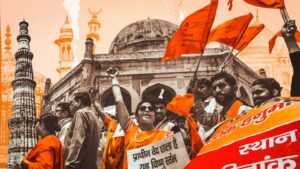 Moon Desk: The Babri Masjid dispute, which dates back to the 16th century, had simmered for centuries before escalating into a major conflict in the late 20th century. In 1992, the Babri Masjid was demolished by Hindu nationalist groups, leading to widespread violence and communal tensions. This incident scarred the Indian psyche and triggered a long legal battle over the disputed site, culminating in a historic verdict by the Supreme Court of India in November 2019. The court ruled that the disputed land should be handed over to the Hindus for the construction of a Ram Mandir, which was seen as a compromise aimed at resolving a contentious issue, but it had far-reaching implications for India’s globalist image.
Moon Desk: The Babri Masjid dispute, which dates back to the 16th century, had simmered for centuries before escalating into a major conflict in the late 20th century. In 1992, the Babri Masjid was demolished by Hindu nationalist groups, leading to widespread violence and communal tensions. This incident scarred the Indian psyche and triggered a long legal battle over the disputed site, culminating in a historic verdict by the Supreme Court of India in November 2019. The court ruled that the disputed land should be handed over to the Hindus for the construction of a Ram Mandir, which was seen as a compromise aimed at resolving a contentious issue, but it had far-reaching implications for India’s globalist image.
The construction of the Ram Mandir symbolises the BJP’s efforts to consolidate Hindu votes and promote a Hindu-centric agenda. By promising to construct the Ram Mandir, the BJP ensured its electoral success, reflecting the party’s alignment with Hindu nationalism. Besides that, the inclination towards Hindu nationalism can be seen in the government’s policies and actions, such as the Citizenship Amendment Act (CAA) and the National Register of Citizens (NRC), which critics argue discriminates against religious minorities, particularly Muslims.
In a country of 1.4 billion people, religious minorities account for roughly 20 per cent — including 200 Muslims and 28 million Christians — and are the target of Hindu nationalism that has gained momentum during the oppressive nine-year rule of PM Narender Modi. A raft of new draconian and discriminatory laws interfering in the daily lives of Muslims and Christians — concerning the food they eat, the clothes they wear, and their ways and timings of worship — depicts that their legal system failed to hold officials accountable. Besides, there are public debates on whether Muslim girls should be allowed to wear headscarves in school, mosques should broadcast azaan aloud and cow slaughter be permitted or not.
For many Indian Muslims, incendiary comments from fellow Hindus and unsolicited debates in public make them feel unwelcome in their own country. Even Christians have faced similar hostilities that peaked in 2021, considered the most violent year on record. Attacks on Christians are quite rampant, especially when Hindu nationalist mobs attack religious gatherings at churches and in the homes by accusing Christians of forcing Christianity upon unsuspecting Hindus. As a result, Hindu mobs beat pastors, vandalised churches and set ablaze missionary schools.
Regrettably, many Hindu Indians seem comfortable with Modi’s ethno-nationalist acts and consider him a son of the soil because 80 per cent of India’s population is Hindu. If no restraint on the Hinduisation of the state comes from within India, how can we expect the world to stand by the religious minorities, enduring threats to their existence for years? However, India’s international allies — including the US — have shown a bit of concern over the treatment of its religious minorities.
The world is witnessing how India is drifting away from secularism, enshrined in its constitution, under a right-wing extremist government, acknowledging Hindus as superior to minorities. These xenophobic policies and authoritarian steps of the BJP government are opposing the liberal democratic framework envisioned by their forefathers.





